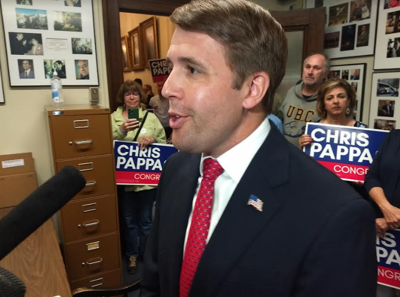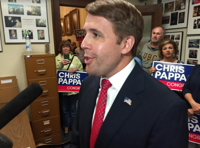WASHINGTON — Permanently placing all fentanyl analogs on the federal drug schedule would help law enforcement deal with growing opioid deaths in New Hampshire, according to Rep. Chris Pappas, D-N.H.
The U.S. House approved the Halt Fentanyl Act late last week on a bipartisan vote of 289-133.
The issue resulted in a rare break for Pappas with Rep. Annie Kuster, D-N.H., who joined with most Democrats (132-74) who opposed this legislation and charged that it would lead to even more overcrowding in federal prisons.
House Republicans had backed it, 215-1.
For the past few years, Pappas has been seeking this legislation that he said would allow federal, state and local police to stay ahead of the drug cartels that continue to peddle deadly fentanyl in slightly-altered forms to try and evade prosecution.
“We have done temporary extensions of this a few times but it’s time we got the job done and made the work of our first responders easier to accomplish,” Pappas said during a telephone interview.
This would permit law enforcement to act quickly to shut down illegal drug trafficking, he said.
“This allows our police to start with the presumption that the drugs are deadly and that we need to interdict the trafficking of these drugs,” Pappas said.
More than 150 groups of civil rights, legal advocates and religious organizations charged it was another example of the “ineffective and punitive strategies” used in the federal war against illegal drugs.
The American Civil Liberties Union, Center for Disabilities Rights, Human Rights Watch, National Council of Churches, the National Association for Criminal Defense Lawyers, the National Organization for Women and the National Immigration Project all weighed in against the measure.
“By automatically scheduling a huge swathe of substances in one fell swoop, the HALT Fentanyl Act would lead to very real criminal justice consequences, posing an unacceptable risk of unnecessary incarceration for substances that carry no potential for abuse,” they argued in a letter to House Republican and Democratic leaders last week.
They also said the measure would lead to stiff mandatory minimum prison terms at the federal level for what could be “trace” amounts of an opioid that may have beneficial effects if used properly in medical treatments.
“This means that researchers and scientists are not able to study these substances at a time when the U.S. is experiencing record number overdose deaths,” they further wrote.
President Joe Biden had offered his support for the measure in a statement from his Office of Management and Budget, adding that it has been a priority of his since September 2021.
Biden sought change that didn’t make final bill
But Biden had urged Congress to include a provision that didn’t make it into the legislation to create an easy “off-ramp” for federal regulators to take off the drug schedule a substance that is proven not to warrant being there.
Rep. Sydney Kamlager-Dove, D-California, said the bill would result in more jail time for minorities.
“Did we learn nothing from the war on drugs? I guess not,” she said during floor debate.
“Back then we enacted ineffective and punitive laws that only worked to expand mass incarceration, mostly of Black and Brown folks. This legislation will enact ineffective and punitive drug laws that only work to expand mass incarceration.”
Other House Democrats said they wanted to alter the minimum mandatory sentences in the bill so they only applied if the fentanyl seized led to “serious bodily injury or death.”
The House rejected, 233-190, an amendment from Rep. Brittiany Petersen, D-Colorado, that would have delayed implementation until the Biden administration certified that it would lead to fewer opioid overdose deaths in the U.S.
Both Kuster and Pappas had voted for it.
Pappas is optimistic the Democratically-led U.S. Senate will support what the GOP-led House has done on the topic.
“With this provision expiring at the end of the year, time is of the essence,” Pappas said.
Last year, Pappas had worked to convince Congress to include a one-year extension of this scheduling in the federal spending bill passed last fall.
Pappas said he was disappointed the final bill did not include all the proposals of a separate, bipartisan bill he authored with Reps. Dan Newhouse, D-Washington, and Tony Gonzales, R-Texas, known as the Save Americans from the Fentanyl Emergency Act or SAFE Act.
One provision would allow the federal government to contract with private companies to do research into fentanyl-related substances and create a streamlined process to facilitate research into Schedule 1 drugs.
“I’m going to keep working to try and find other legislation that we can use to advance these other proposals,” Pappas said.












